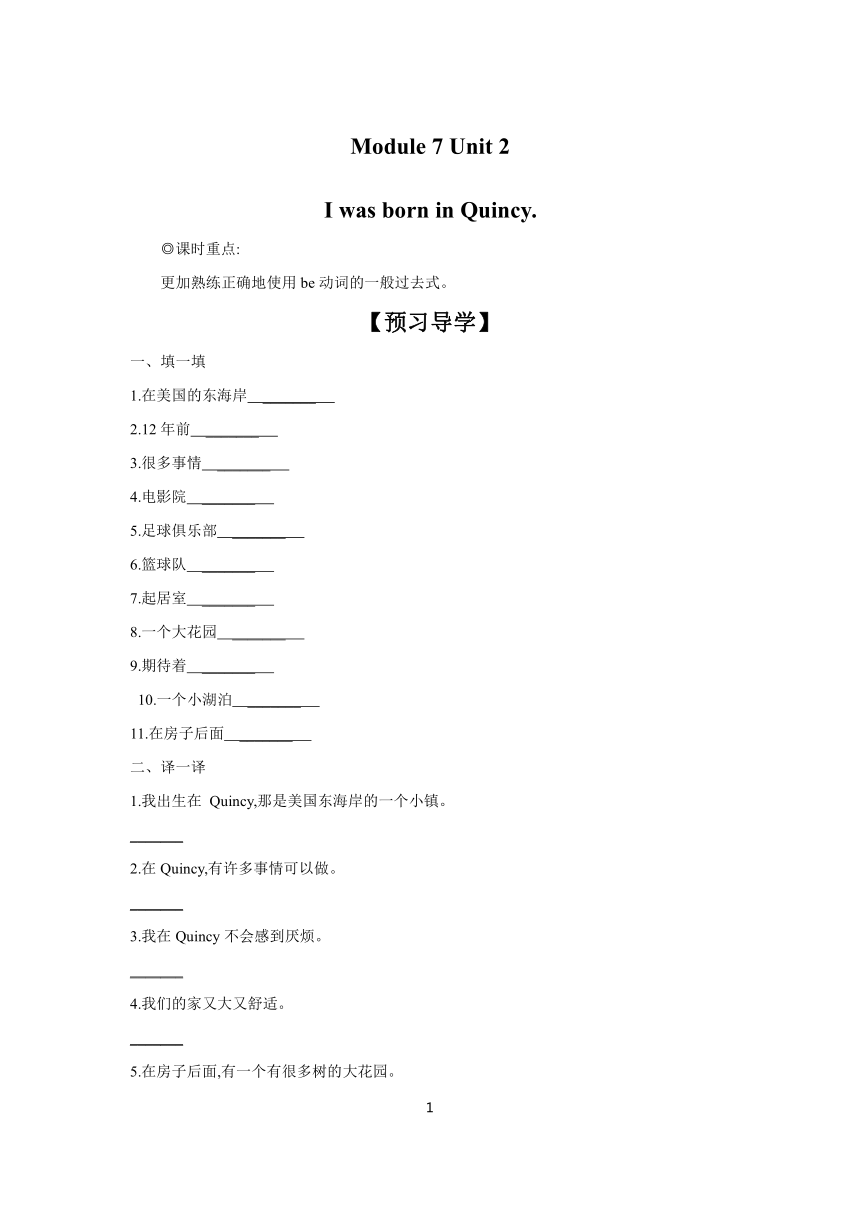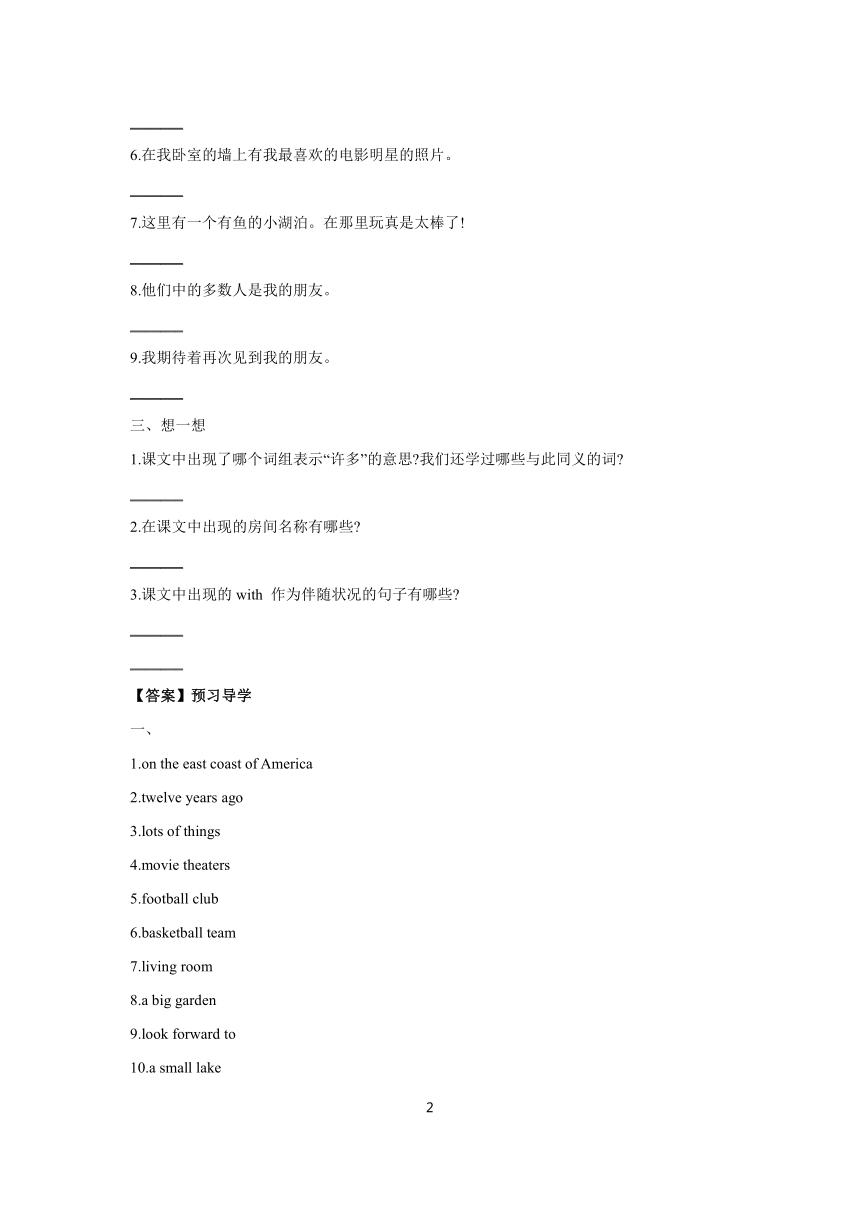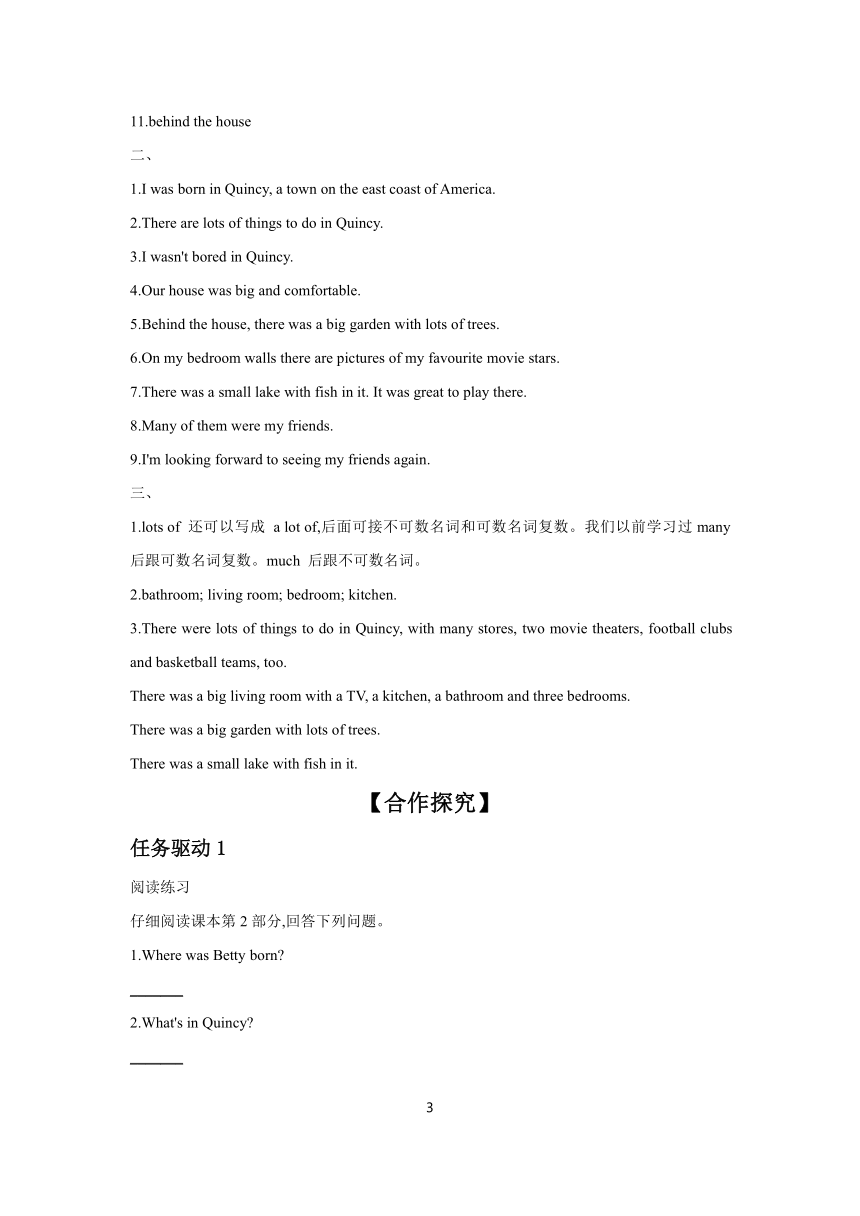Module 7 My past life Unit 2 学案 2023-2024学年初中英语外研版七年级下册(含答案)
文档属性
| 名称 | Module 7 My past life Unit 2 学案 2023-2024学年初中英语外研版七年级下册(含答案) |

|
|
| 格式 | docx | ||
| 文件大小 | 24.5KB | ||
| 资源类型 | 教案 | ||
| 版本资源 | 外研版 | ||
| 科目 | 英语 | ||
| 更新时间 | 2024-02-20 00:00:00 | ||
图片预览



文档简介
Module 7 Unit 2
I was born in Quincy.
◎课时重点:
更加熟练正确地使用be动词的一般过去式。
【预习导学】
一、填一填
1.在美国的东海岸 _______
2.12年前 _______
3.很多事情 _______
4.电影院 _______
5.足球俱乐部 _______
6.篮球队 _______
7.起居室 _______
8.一个大花园 _______
9.期待着 _______
10.一个小湖泊 _______
11.在房子后面 _______
二、译一译
1.我出生在 Quincy,那是美国东海岸的一个小镇。
_______
2.在Quincy,有许多事情可以做。
_______
3.我在Quincy不会感到厌烦。
_______
4.我们的家又大又舒适。
_______
5.在房子后面,有一个有很多树的大花园。
_______
6.在我卧室的墙上有我最喜欢的电影明星的照片。
_______
7.这里有一个有鱼的小湖泊。在那里玩真是太棒了!
_______
8.他们中的多数人是我的朋友。
_______
9.我期待着再次见到我的朋友。
_______
三、想一想
1.课文中出现了哪个词组表示“许多”的意思 我们还学过哪些与此同义的词
_______
2.在课文中出现的房间名称有哪些
_______
3.课文中出现的with 作为伴随状况的句子有哪些
_______
_______
【答案】预习导学
一、
1.on the east coast of America
2.twelve years ago
3.lots of things
4.movie theaters
5.football club
6.basketball team
7.living room
8.a big garden
9.look forward to
10.a small lake
11.behind the house
二、
1.I was born in Quincy, a town on the east coast of America.
2.There are lots of things to do in Quincy.
3.I wasn't bored in Quincy.
4.Our house was big and comfortable.
5.Behind the house, there was a big garden with lots of trees.
6.On my bedroom walls there are pictures of my favourite movie stars.
7.There was a small lake with fish in it. It was great to play there.
8.Many of them were my friends.
9.I'm looking forward to seeing my friends again.
三、
1.lots of 还可以写成 a lot of,后面可接不可数名词和可数名词复数。我们以前学习过many后跟可数名词复数。much 后跟不可数名词。
2.bathroom; living room; bedroom; kitchen.
3.There were lots of things to do in Quincy, with many stores, two movie theaters, football clubs and basketball teams, too.
There was a big living room with a TV, a kitchen, a bathroom and three bedrooms.
There was a big garden with lots of trees.
There was a small lake with fish in it.
【合作探究】
任务驱动1
阅读练习
仔细阅读课本第2部分,回答下列问题。
1.Where was Betty born
_______
2.What's in Quincy
_______
3.What famous people were born in Quincy
_______
4.What was Betty's house like What was in the house
_______
5.What was the garden like
_______
任务驱动2 完成句子
根据你的个人情况,回答下列问题。
1.When and where were you born
_______
2.What was your bedroom like
_______
3.Were you happy there
_______
4.What was your house like
_______
5.Were there lots of things to do
_______
任务驱动3 写作练习
根据活动二的问答情况,写一篇介绍自己过去的短文。
_______
【答案】合作探究
任务驱动一 阅读练习
1.She was born in Quincy.
2.There were many stores, two movie theaters, football clubs and basketball teams.
3.Two presidents of the US, John Adams and his son John Quincy Adams were born in Quincy.
4.Betty's house was big and comfortable. There was a big living room with a TV, a kitchen, a bathroom and three bedrooms.
5.There were lots of trees and a small lake with fish in it. It was great to play there.
任务驱动二 完成句子
1.I was born in... on...
2.It was very tidy. It was very beautiful.
3.Yes, I was./No, I wasn't.
4.There was a living room, three bedrooms, a bathroom and a kitchen.
5.Yes, I could play with a ball. I could watch TV and so on.
任务驱动三 写作练习
I was born in a small village in 2007. There was a big yard with three trees in it. There was a big house with a living room, three bedrooms, a bathroom and a kitchen. There were many things to do there. I could play balls. I could watch TV. I was very happy then.
【知识超市】
●There were lots of things to do in Quincy with many stores. 在Quincy,有很多商店,有许多事情可以做。
句中的“with...”是一个介词短语,用来修饰Quincy。例如:
“There was a big living room with a TV.”中的with a TV修饰living room,表示这是一个带有电视的起居室。
到目前为止,我们已经学习过介词with 的三种用法。请观察例句:
1.I am going to have a picnic with my friends.我将和我的朋友去野餐。
2.Teachers won't write on the blackboard with chalk.老师们不再用粉笔在黑板上写字。
3.China is an old country with 1.4 billion people.中国是一个拥有14亿人口的古老国家。
例句1中的with 意为 “和……一起”。例句2中的with 意为“使用”。例句3中的with 意为“有着”。
lots of意为“很多;许多”, 后接可数名词复数和不可数名词。例如:
There were lots of students in our school.在我们学校有很多学生。
There was lots of water in the bottle.瓶子里有很多水。
做一做:单项选择。
( _______)1.Project Hope has built many schools big classrooms and libraries.
A.in B.of
C.for D.with
( _______)2.Linda is not good at Chinese, but she passed the exam the help of her classmates.
A.with B.under
C.without D.of
●I am looking forward to seeing my friends again. 我期待着再次见到我的朋友。
look forward to doing 意为“盼望做某事”,这个短语中的to不是动词不定式,而是一个介词,它后面的动词要用其-ing形式。例如:
He looks forward to having a large house. 他盼望拥有一套大房子。
做一做:根据汉语提示完成句子,每空一词。
我期待在晚会上见到我的老朋友。
I look forward to _______ _______ _______ _______ at the party.
【答案】
知识超市
做一做:
1.D 2.A
做一做:
seeing my old friends
2
I was born in Quincy.
◎课时重点:
更加熟练正确地使用be动词的一般过去式。
【预习导学】
一、填一填
1.在美国的东海岸 _______
2.12年前 _______
3.很多事情 _______
4.电影院 _______
5.足球俱乐部 _______
6.篮球队 _______
7.起居室 _______
8.一个大花园 _______
9.期待着 _______
10.一个小湖泊 _______
11.在房子后面 _______
二、译一译
1.我出生在 Quincy,那是美国东海岸的一个小镇。
_______
2.在Quincy,有许多事情可以做。
_______
3.我在Quincy不会感到厌烦。
_______
4.我们的家又大又舒适。
_______
5.在房子后面,有一个有很多树的大花园。
_______
6.在我卧室的墙上有我最喜欢的电影明星的照片。
_______
7.这里有一个有鱼的小湖泊。在那里玩真是太棒了!
_______
8.他们中的多数人是我的朋友。
_______
9.我期待着再次见到我的朋友。
_______
三、想一想
1.课文中出现了哪个词组表示“许多”的意思 我们还学过哪些与此同义的词
_______
2.在课文中出现的房间名称有哪些
_______
3.课文中出现的with 作为伴随状况的句子有哪些
_______
_______
【答案】预习导学
一、
1.on the east coast of America
2.twelve years ago
3.lots of things
4.movie theaters
5.football club
6.basketball team
7.living room
8.a big garden
9.look forward to
10.a small lake
11.behind the house
二、
1.I was born in Quincy, a town on the east coast of America.
2.There are lots of things to do in Quincy.
3.I wasn't bored in Quincy.
4.Our house was big and comfortable.
5.Behind the house, there was a big garden with lots of trees.
6.On my bedroom walls there are pictures of my favourite movie stars.
7.There was a small lake with fish in it. It was great to play there.
8.Many of them were my friends.
9.I'm looking forward to seeing my friends again.
三、
1.lots of 还可以写成 a lot of,后面可接不可数名词和可数名词复数。我们以前学习过many后跟可数名词复数。much 后跟不可数名词。
2.bathroom; living room; bedroom; kitchen.
3.There were lots of things to do in Quincy, with many stores, two movie theaters, football clubs and basketball teams, too.
There was a big living room with a TV, a kitchen, a bathroom and three bedrooms.
There was a big garden with lots of trees.
There was a small lake with fish in it.
【合作探究】
任务驱动1
阅读练习
仔细阅读课本第2部分,回答下列问题。
1.Where was Betty born
_______
2.What's in Quincy
_______
3.What famous people were born in Quincy
_______
4.What was Betty's house like What was in the house
_______
5.What was the garden like
_______
任务驱动2 完成句子
根据你的个人情况,回答下列问题。
1.When and where were you born
_______
2.What was your bedroom like
_______
3.Were you happy there
_______
4.What was your house like
_______
5.Were there lots of things to do
_______
任务驱动3 写作练习
根据活动二的问答情况,写一篇介绍自己过去的短文。
_______
【答案】合作探究
任务驱动一 阅读练习
1.She was born in Quincy.
2.There were many stores, two movie theaters, football clubs and basketball teams.
3.Two presidents of the US, John Adams and his son John Quincy Adams were born in Quincy.
4.Betty's house was big and comfortable. There was a big living room with a TV, a kitchen, a bathroom and three bedrooms.
5.There were lots of trees and a small lake with fish in it. It was great to play there.
任务驱动二 完成句子
1.I was born in... on...
2.It was very tidy. It was very beautiful.
3.Yes, I was./No, I wasn't.
4.There was a living room, three bedrooms, a bathroom and a kitchen.
5.Yes, I could play with a ball. I could watch TV and so on.
任务驱动三 写作练习
I was born in a small village in 2007. There was a big yard with three trees in it. There was a big house with a living room, three bedrooms, a bathroom and a kitchen. There were many things to do there. I could play balls. I could watch TV. I was very happy then.
【知识超市】
●There were lots of things to do in Quincy with many stores. 在Quincy,有很多商店,有许多事情可以做。
句中的“with...”是一个介词短语,用来修饰Quincy。例如:
“There was a big living room with a TV.”中的with a TV修饰living room,表示这是一个带有电视的起居室。
到目前为止,我们已经学习过介词with 的三种用法。请观察例句:
1.I am going to have a picnic with my friends.我将和我的朋友去野餐。
2.Teachers won't write on the blackboard with chalk.老师们不再用粉笔在黑板上写字。
3.China is an old country with 1.4 billion people.中国是一个拥有14亿人口的古老国家。
例句1中的with 意为 “和……一起”。例句2中的with 意为“使用”。例句3中的with 意为“有着”。
lots of意为“很多;许多”, 后接可数名词复数和不可数名词。例如:
There were lots of students in our school.在我们学校有很多学生。
There was lots of water in the bottle.瓶子里有很多水。
做一做:单项选择。
( _______)1.Project Hope has built many schools big classrooms and libraries.
A.in B.of
C.for D.with
( _______)2.Linda is not good at Chinese, but she passed the exam the help of her classmates.
A.with B.under
C.without D.of
●I am looking forward to seeing my friends again. 我期待着再次见到我的朋友。
look forward to doing 意为“盼望做某事”,这个短语中的to不是动词不定式,而是一个介词,它后面的动词要用其-ing形式。例如:
He looks forward to having a large house. 他盼望拥有一套大房子。
做一做:根据汉语提示完成句子,每空一词。
我期待在晚会上见到我的老朋友。
I look forward to _______ _______ _______ _______ at the party.
【答案】
知识超市
做一做:
1.D 2.A
做一做:
seeing my old friends
2
同课章节目录
- Module 1 Lost and found
- Unit 1 Whose bag is this?
- Unit 2 Are they yours?
- Unit 3 Language in use
- Module 2 What can you do ?
- Unit 1 I can play the piano
- Unit 2 I can run really fast
- Unit 3 Language in use
- Module 3 Making plans
- Unit 1 What are you going to do at the weekends?
- Unit 2 We're going to cheer the players.
- Unit 3 Language in use
- Module 4 Life in the future
- Unit 1 Everyone will study at home
- Unit 2 Every family will have a small plane.
- Unit 3 Language in use
- Module 5 Shopping
- Unit 1 What can I do for you?
- Unit 2 You can buy everything on the Internet
- Unit 3 Language in use
- Module 6 Around town
- Unit 1 Could you tell me how to get to the Nationa
- Unit 2 The London Eye is on your right.
- Unit 3 Language in use
- Revision module A
- Module 7 My past life
- Unit 1 I was born in a small village.
- Unit 2 I was born in Quincy.
- Unit 3 Language in use
- Module 8 Story time
- Unit 1 Once upon a time….
- Unit 2 Goldilocks hurried out of the house.
- Unit 3 Language in use
- Module 9 Life history
- Unit 1 He left school and began work at the age of
- Unit 2 He decided to be an actor.
- Unit 3 Language in use
- Module 10 A holiday journey
- Unit 1 What did you do?
- Unit 2 This morning we took a walk.
- Unit 3 Language in use
- Module 11 Body language
- Unit 1 They touch noses!
- Unit 2 Here are some ways to welcome them.
- Unit 3 Language in use
- Module 12 Western music
- Unit 1 It's so beautiful!
- Unit 2 Vienna is the centre of European classical
- Unit 3 Language in use
- Revision module B
